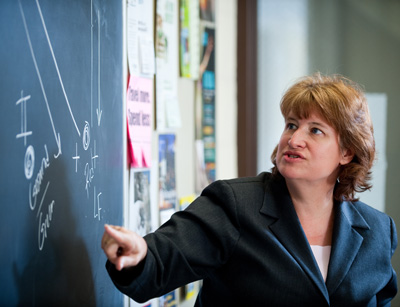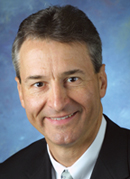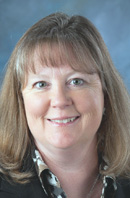By Barb Arland-Fye

DAVENPORT — Responding to regional health care needs and building on its strengths in that field, St. Ambrose University announced May 8 a new Master of Physician Assistant Degree Program.
University officials say it is the first such program offered in the Quad-Cities and western Illinois region, and they hope to see the first class begin studies in June 2014 and graduate 27 months later.
St. Ambrose President Sister Joan Lescinski, CSJ, said the new graduate program “is an excellent addition to an already exceptional set of offerings in the health sciences field at St. Ambrose. At a time of economic challenge, St. Ambrose offers students the opportunity to prepare for well-paying careers with myriad employment opportunities.”

Dr. Michael Giudici, a cardiologist specializing in heart rhythm disorders, sees the benefits of the MPA program from three vantage points: as a health provider, a member of the St. Ambrose Board of Trustees and a Quad-Citian.
“From a health provider standpoint, I think it’s great that some of these students will be rotating through the hospital and we’ll have the opportunity to teach them, to learn from them and to basically give them a two-year job interview, or internship, so to speak,” Dr. Giudici said. From his perspective as a Quad-Citian, the MPA program “gives us one more reason to attract sharp young people to the Quad Cities.” From his St. Ambrose perspective, he sees value in “being able to offer a wide range of health-care opportunities.”
St. Ambrose’s commitment to the community is impressive, he added. “When they look at programs, they ask, ‘What does this community need?’”
Demand for physician services is increasing rapidly as the nation’s population continues to age, grow, live longer and have more chronic illnesses that require increased medical attention, according to the American Association of Medical College Center (AAMC) for Workforce Studies. Physician assistants are part of the solution to help alleviate shortages in states where the distribution of physician providers is problematic.
Sandy Cassady, dean of St. Ambrose’s College of Health and Human Services, was asked two years ago to research what health science programs the university might offer in addition to its accredited programs in nursing, physical therapy, occupational therapy, speech language pathology and social work.
“An area of practice that rose to the top was this mid-level provider — physician assistants and nurse practitioners — which can help extend the care in medicine.” She noted a projected shortage of 124,000 physicians by 2025. “Physician assistants and nurse practitioners are definitely part of the solution, and the training time is quite a bit less. This is an attractive opportunity.”
In 2011 Forbes Magazine gave the Physician Assistant graduate degree a first-place ranking for the “best long-term opportunity” master’s degree based on salary and employment outlook, citing, in part, the U.S. Bureau of Labor Statistics projections.
St. Ambrose is investing approximately $1 million over a two-year period as the start-up for its MPA program. The university must receive provisional accreditation before accepting students, Cassady said. “Our College of Health and Human Services has secured accreditation from many accrediting organizations. We have much experience in this,” she added, noting the university should learn about accreditation for the MPA program in fall 2013.

In the meantime, the university has appointed Omaha native Clare Kennedy as its MPA program director and introduced her at a May 8 press conference. She has been a Physician Assistant since 1996 and served as assistant professor in the University of Nebraska Medical Center Physician Assistant program, where she also served as faculty mentor of the student-run clinic for the underserved. Earlier in her career Kennedy directed the Rosebud Reservation Cancer Center in South Dakota, and was the telemedicine coordinator at the Rosebud Indian Health Service Hospital, Rosebud, S.D.
“I’m excited to have been chosen as founding director of St. Ambrose’s newest degree program in the health sciences field and look forward to educating the next generation of Physician Assistants,” she said. Her goal is for the St. Ambrose MPA program to become one of the best in the nation. “I have a good grasp of the Physician Assistant profession and the training and education necessary to put highly qualified Physician Assistants into the workforce,” she added.
Entry into the St. Ambrose program will be a competitive process. Applicants must have earned their undergraduate degree; successfully completed specific prerequisite courses; and gained at least 500 hours of health care experience. Students will begin with classroom and laboratory studies including anatomy, pathology, physical examination and clinical medicine during the first 15 months, followed by 12 months of clinical rotations under the supervision of physicians and other specialists in required and elective practice areas of clinical specialization. Based on projected needs in rural states, the program will emphasize primary care. Graduates will be eligible to seek licensure to practice in one or more of the 50 states.
Physician Assistants provide patient care that includes taking medical histories, completing examinations, ordering diagnostic tests and prescribing medication as part of medical care. PAs attend to a wide variety of patients, assist in surgery, or specialize in an area of practice in conjunction with their supervising physician.
Vicki Hughes has been a board-certified Physician Assistant for 26 years. “I absolutely love it. It’s so incredibly challenging,” said the mother of two who works at Community Health Care clinic in Moline, Ill. She appreciates being able to get to know her patients over time and working in a career that allows her family time.
When she entered the field in 1986, jobs were scarce, but not anymore with the demand for primary care far outpacing the physicians needed. She receives mail every week about available openings for Physician Assistants.
“Health care has changed so much in the past 20 years,” Hughes said. “It’s growing and the need is growing, and that has been a nice benefit to the profession.”
St. Ambrose is on cutting edge in health care
DAVENPORT — St. Ambrose University’s decision to establish a Master of Physician Assistant Degree Program will go a long way toward addressing health care needs and growing, unsustainable health care costs, Davenport Mayor Bill Gluba said May 8.
“Clearly the university understands where the jobs of the present and the future are for its students. For example, Davenport’s largest employer is Genesis Health Care System,” the mayor said during a press conference on campus to announce the new Physician Assistant Program.
Health expenditures in the United States neared $2.6 trillion in 2010, he noted, and health spending accounted for 17.9 percent of the nation’s Gross Domestic Product in 2010. The employment of Physician Assistants can help reduce costs while providing health care in rural and urban settings that are underserved by physicians, he added.
He commended the university’s commitment to social justice by providing students with education that allows them to respond to the needs of the community.
“More and more often, Physician Assistants are playing a key role in the provision of health care services,” said St. Ambrose President Sister Joan Lescinski, CSJ. “I’m sure that many of you have either been seen by or have a family member who has been treated by one,” added Sr. Lescinski, who mentioned that her parents appreciate the care they receive from a Physician Assistant.
“Enriching the lives of others, one key aspect of our university mission, is clearly realized in this response to significant local and regional needs for primary care services. It is also realized in the opportunities offered to those who will take on the challenges of the rigorous MPA coursework and clinicals, and who will find themselves in the enviable position of knowing they will have well-paying, meaningful work — with jobs waiting.”
Sandy Cassady, dean of St. Ambrose’s College of Health and Human Services, also spoke at the press conference about the shortage of health care service providers and how the College of Health and Human Services is equipped to respond.
“We are partners with physicians,” said Clare Kennedy, an Omaha native who was introduced at the press conference as the MPA program director. She shared a story that made a lasting impression about health care needs in this country.
In one of her previous assignments she directed the Rosebud Reservation Cancer Center in South Dakota, which assisted numerous patients in the later stages of cancer. The center recruited physicians to assist with mammogram screenings on a volunteer basis. One radiologist from Illinois screened as many as 200 women over a three-day period, Kennedy said. When he finished his assignment, he told Kennedy he had been on several mission trips — but had no idea there was “a third-world country in his own backyard,” she said. “I don’t think people realize there’s a real need, right here.”








